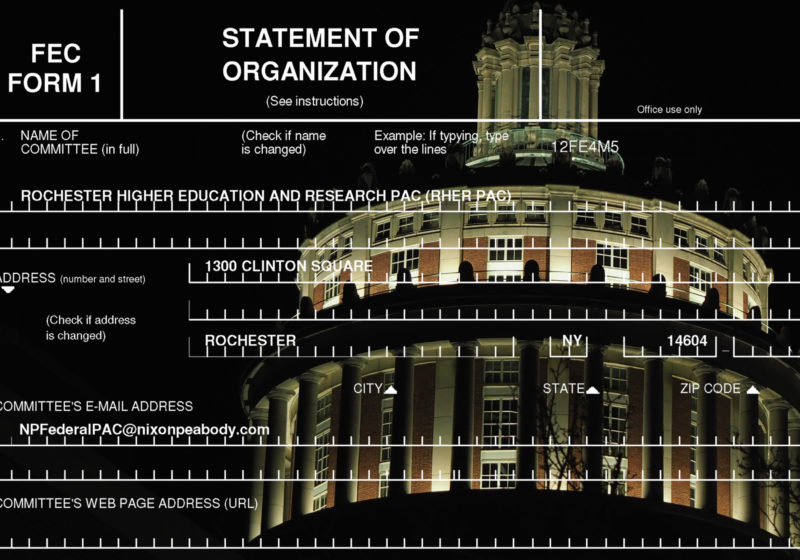One day, I was working on a project for the Campus Times about the relationship between politics and the University. I thought it would be fun to look up the political donation history of University employees since political donations are publicly disclosed. But I found something more interesting than the few Trump supporters and general institutional support behind Biden.
When I looked up Joel Seligman’s donor history, I noticed that his only political donations in the past 10 years were five spread-out installments to a political action committee (PAC) called the “Rochester Higher Education and Research PAC,” (RHER PAC), for a total of $11,000. That was when I got curious: What exactly is this PAC about?
The earliest donations to RHER PAC were in 2003. Its treasurer and “custodian of records” is an employee of Rochester law firm Nixon Peabody. The listed address is in the firm’s office building, and the listed email address is a Nixon Peabody address.
The PAC, in the grand scheme of politics, does not have a particularly huge footprint. It raised only $8,500 in the 2019-2020 election cycle, though that was its worst fundraising cycle since the PAC began in 2003. Most cycles, it raised between $25,000 and $35,000, and in the 2009-2010 cycle, it brought in $43,275.
The PAC’s beneficiaries are on both sides of the aisle and tend to have the University under their constituency. Since 2016, its beneficiaries included Democratic Governor Andrew Cuomo, Democratic Congressman Joe Morelle, Morelle’s predecessor and Democrat Louise Slaughter, Morelle’s unsuccessful Republican opponent Dr. Jim Maxwell, and Republican now-retired state senator Joe Robach.
All of the PAC’s donors since 2016 were either members of the Board of Trustees or University employees. The names are familiar: Danny Wegman, Edmund Hajim, Wayne LeChase, etc. Nearly all of the donations are at least $1,000 at a time.
All of that information was publicly available, right out in the open. I had several questions. How affiliated is this PAC with the University? Since the PAC doesn’t have a website and is not mentioned anywhere except in the depths of campaign finance tracking websites, how are donations solicited? And what does the PAC truly advocate for?
In trying to answer these questions, I sent an email to the treasurer asking for an interview about the PAC. Then, to answer broader questions for my project about the University’s political ties, I sent an email to Peter Robinson, a University Vice President in charge of the Office of Government and Community Relations, and a separate email to Vice President and General Counsel Donna Gooden Payne. I didn’t mention anything about the PAC in my communications with University administrators.
Quickly, Robinson responded, agreeing to an interview, and inviting Associate Vice President at the Office of Government and Community Relations, Josh Farrelman, which seemed entirely reasonable. But then he added Payne into the interview, presumably to kill two birds with one interview. However, once Assistant Vice President for Communications and University Spokesperson Sara Miller was added to the interview, I knew they were getting defensive.
On the day of the interview, Robinson and I got in the Zoom room first. While we were waiting for the others, he mentioned that he saw I’d been asking around about the PAC and that he would be ready to answer questions about it. Since I’d only mentioned the PAC in an email to its treasurer (who never responded), the treasurer must have contacted Robinson about it.
As a 501(c)(3) nonprofit educational institution, the University cannot donate directly to political campaigns, nor can they directly support or oppose any political candidates. Therefore, UR cannot have direct ties to a PAC. According to Robinson — who is among the donors to the PAC — the RHER is completely separate from the University. He said that donations are not solicited through official channels, but instead are cultivated by individuals outside of their University positions. But given that I contacted Robinson to conduct an interview in his official capacity, and since he said he’d talk about the PAC without me asking about it, the lines between “University official” and “private citizen” are clearly murky.
Robinson said that the PAC was founded by the late G. Robert Witmer, who was a trustee, judge, and partner at Nixon Peabody, and that Witmer used his own personal network of people who care about higher education and research issues in Rochester to solicit donations.
“This PAC advocates for things like funding aid, Pell Grants, [National Institutes of Health] funding, [American Science Foundation] funding, and things of that nature,” Robinson said. “Those things are important to the research enterprise in the community as well.”
He later repeated that it’s separate from the University and compliant with campaign finance laws, including reporting laws. Given that the PAC could be found through publicly available databases, that’s certainly true. “It’s not a state secret,” Robinson said.
While the distinction between individuals donating to the PAC through unofficial channels and the University itself having a PAC allows for the University to legally maintain its nonprofit status, it still illustrates serious debates about the role of a university in politics and also about the political issue of campaign finance policy.
“This particular PAC that we are talking about is, I think, pretty altruistic,” Robinson said. “Nobody in the PAC gets any direct benefit back personally, but if there is something positive, it adds further influence to people who support its purpose.”
I’m sure many colleges and universities have similar unofficial PACs representing higher education issues. I’m sure those PACs are mostly or exclusively supported by donors who also work at that university. This may be the norm, and this may even be altruistic, but it highlights a broader trend of abused legal loopholes and University officials playing an outsized role in politics.






